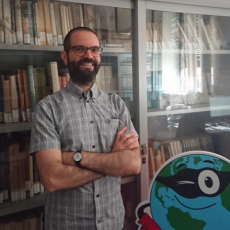Objectives
The course covers aspects of Environmental geography such as sustainability and environmental policies, in order to provide a theoretical framework for a better understanding of the processes behind the current ecological transition. The course will also focuses on geotechnologies such as Geographical InformationSystems, which will be applied to analyse real-world scenarios and to process spatial datasets which represent environmental phenomena.
Channels
 DAVIDE PAVIA Teacher profile
DAVIDE PAVIA Teacher profile
Programme
The course aims to develop some of the major key themes of environmental geography such as the meaning of environment, the types of pollution, the governance and the active citizenship, in order to provide to the participants the knowledge to understand ongoing ecological transition, also through the use of geographical technologies capable of representing and analyzing the environmental dynamics of a given territory.
Starting from the build-up of an accurate vocabulary, the course will focus on the mechanisms that govern the functioning of an ecosystem, highlighting its properties and services offered at different scales. Tracing back some of the stages of the industrial society and urban settlements evolution, the major forms of environmental degradation will be discussed, such as deforestation and desertification, using geoinformatics tools to carry out some in-depth studies on the environments most impacted by pollution, in order to integrate the theoretical part of the course with references to the scenarios characteristics of the current environmental emergency.
To rigorously apply the geotechnologies, part of the course will be dedicated to the fundamentals of numerical mapping, together with the demonstration of freeware and commercial GIS software through which conduct, optionally, an elaboration on an area of study of own interest, which will be taken into account during the exam.
Course topics schema and estimation of the hours:
1. Environmental geography, discussion of the major key themes of the discipline and acquisition of an ad hoc vocabulary, references to the dynamics inherent in the current ecological transition [12 hours].
2. Numerical mapping, study of the fundamentals of the discipline preparatory to the use of geotechnological tools, demonstration of the functioning of both freeware and commercial GIS software [12 hours].
3. Laboratory, application of GIS software for the creation of own elaborations and their discussion [12 hours].
4. Seminars and in-depth activities [6 hours].
Adopted texts
o Bagliani M., Dansero E., Politiche per l'ambiente: dalla natura al territorio, UTET Università, Torino, 2011.
o Favretto A., Cartografia nelle nuvole, Pàtron, Bologna, 2016.
Prerequisites
Prerequisite for participation in the course is an excellent knowledge of the Italian language, together with the basic English that will be used especially in the part of the teaching concerning geographical technologies. Those who possess even minimal knowledge of the topics of General Geography (shape of the Earth, calculation of coordinates etc.) will be facilitated in understanding the topics covered by this course, as well as the possession of notions of computer science could facilitate those who participate during the laboratory part.
Study modes
With a view to achieving the educational objectives of the teaching, aimed at developing both knowledge and skills in the field of Environmental Geography and Geographical Technologies, the course will include different teaching methods. Specifically, the traditional frontal lessons will be integrated with demonstrations of the functioning of commercial and non-commercial GIS programs, in order to allow those who attend the lessons to experiment with them. Part of the lessons will be dedicated to the presentation of the works of those who want to make them orally, putting into practice the teaching methodology of the flipped classroom.
Frequency modes
The course does not require attendance.
Exam modes
The normal method of evaluation of the course will consist of a written test of 15 open and closed questions which, if completed correctly, will allow the acquisition of a maximum of 30 points.
Other methods of evaluation such as the oral one may integrate or replace the written one depending on contingent factors such as: the number of registered for the appeal; the sanitary conditions; the availability of classrooms.
Those who carry out an elaboration in the manner envisaged and described on the Moodle of the course will be entitled to receive a bonus during the exam, equal to an increase in the evaluation score of a maximum of three points.
| Exam reservation date start | Exam reservation date end | Exam date |
|---|---|---|
| 01/01/2024 | 07/01/2024 | 09/01/2024 |
| 22/01/2024 | 28/01/2024 | 30/01/2024 |
| 05/02/2024 | 11/02/2024 | 13/02/2024 |
| 15/04/2024 | 18/04/2024 | 23/04/2024 |
| 04/06/2024 | 07/06/2024 | 12/06/2024 |
| 18/06/2024 | 21/06/2024 | 26/06/2024 |
- Academic year: 2023/2024
- Curriculum: Curriculum unico
- Year: Second year
- Semester: First semester
- SSD: M-GGR/01
- CFU: 6
- Attività formative caratterizzanti
- Ambito disciplinare: Discipline dell'ambiente, biologiche, geografiche e geologiche
- Lecture (Hours): 42
- CFU: 6
- SSD: M-GGR/01
